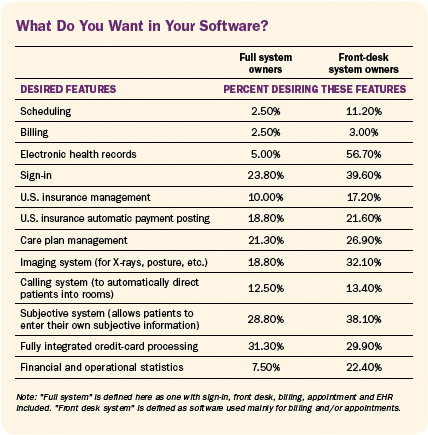It’s a new year and many chiropractors are evaluating what will enhance their respective practices, particularly as it relates to their bottom line. One of the most common questions I get is: “Do I need to be credentialed to bill insurance, and what are the best plans to join?” It’s a loaded question – but one every DC ponders. Whether you're already in-network or pondering whether to join, here's what you need to know.
Chiropractic Practice Software: Is It All You Need It to Be?
It's hard to find a chiropractic practice that isn't using some form of practice software. However, what that software does and doesn't do can be both freeing and frustrating for the doctor and their staff. A recent survey of the chiropractic profession provides insight into what doctors are looking for in their practice software and how satisfied they are. While there are many choices, not all software is the created equal.
Front Desk or EHR?
Of those surveyed, 63 percent use what known as "front desk only" software. This is software used mainly for billing and/or appointments. The other 37 percent use electronic health record (EHR) software. This software generally includes sign-in, front desk, billing, appointments and, of course, electronic health records. While there is plenty of gray area between the two types of chiropractic practice software, doctors who took the survey were asked to choose which type their software was closest to.
A comparison of the two types of practice software reveals some of the differences between them. Some of those differences became more apparent when the doctors were asked which features their software currently didn't have that the doctor wished it included.
Clearly some of the features missing in the "front desk" software were considered important by those doctors of chiropractic who wished they had it. Doctors who are looking to purchase or upgrade their practice software would be advised to consider their need for these missing features, particularly electronic health records, sign in, subjective systems, imaging systems, integrated credit card processing and care plan management. These were on the wish list for more than one-fourth of the doctors of chiropractic who are using front desk software.

Rating the Software Provider
As long as the software works exactly as it should, you (and your staff) understand it completely, and you never want it to do anything else, you don't have to worry about the responsiveness of the company from whom you bought your software. However, that's not how things happen in real life. Having the right software provider can make a world of difference, especially when things don't go the way they should, which appears to happen more with some software than with others. Amazingly enough, some software companies appear to offer little if any support after the program is installed in the doctor's practice.
Looking again at the difference between front desk and EHR software, the comparisons in levels of support in various areas can be significant.
The results of this study do not suggest that all front desk software is lacking in critical functions or that every front desk software fails to provide support. On the contrary, a number of front desk systems were rated very highly. Nevertheless, the old adage of getting what you pay for certainly comes into play.
There are a wide range of choices that should be considered before settling on a particular practice software. This is especially true if it's time to upgrade your current system. Check the list of features, then ask other doctors of chiropractic about their experiences. This will greatly increase your ability to make the right choice for your practice.


